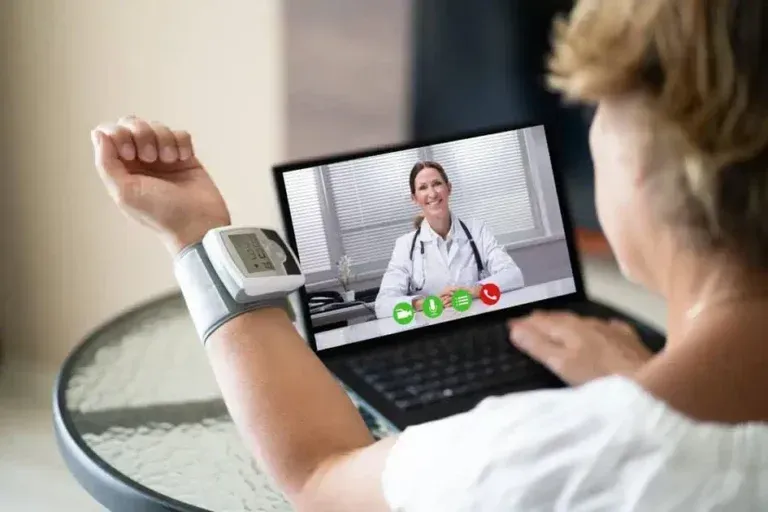Telehealth for Chronic Diseases: Managing Conditions from Home

In healthcare landscape, Telehealth has emerged as a powerful tool in managing chronic diseases, offering patients the flexibility to receive care from the comfort of their homes. Chronic conditions, such as diabetes, heart disease, and arthritis, require consistent, long-term management, making it essential for patients to have easy access to medical support. Telehealth, or remote healthcare, revolutionizes how patients and providers interact, providing a convenient way to monitor and manage chronic conditions without frequent in-person visits. This blog will explore the role of Telehealth in chronic disease management, discuss its benefits and limitations, and offer insights on how patients in Texas and beyond can utilize these services effectively.
What is Telehealth?
Telehealth refers to the use of digital technology to deliver healthcare services remotely. Through video conferencing, online patient portals, and even mobile apps, Telehealth allows healthcare providers to monitor and communicate with patients without requiring them to visit the clinic physically. This approach is precious for managing chronic diseases, where regular monitoring, medication adjustments, and patient education are essential for successful outcomes.
Telehealth and Technology: Transforming Chronic Disease Management
In recent years, advancements in technology have significantly expanded the reach and capabilities of Telehealth. Here are some critical aspects of how technology supports chronic disease management:
Remote Monitoring Devices: Wearable devices and mobile apps can monitor vital signs such as heart rate, blood sugar levels, and blood pressure. This data can be shared in real-time with healthcare providers, who can make timely adjustments to treatment plans as necessary.
Mobile Health Apps: Many health-related apps provide medication reminders, track symptoms, and log lifestyle choices like diet and exercise, helping patients better understand their health patterns.
Electronic Health Records (EHRs): EHRs streamline communication between patients and healthcare providers, allowing for seamless updates and easy access to medical history, treatment plans, and lab results.
By utilizing these digital tools, Telehealth empowers patients with chronic conditions to play an active role in their health management, improving treatment adherence and reducing complications.
Why Telehealth is Ideal for Chronic Disease Management
Increased Accessibility to Specialists
Accessing specialists can be challenging for patients in rural or underserved areas. Telehealth removes geographical barriers by connecting patients with experts regardless of location. Patients can consult with specialists in fields like cardiology, endocrinology, and neurology without traveling long distances, making receiving the specific care needed to manage their chronic condition easier.
Reduced Risk of Infection
Frequent trips to healthcare facilities can increase exposure to infections for patients with compromised immune systems or chronic respiratory conditions. Telehealth reduces the risk of infection by enabling patients to receive care at home. This is especially beneficial for those with conditions like asthma or COPD, where minimizing exposure to infections is essential for maintaining health.
Lower Healthcare Costs
Telehealth can be a cost-effective option for patients with chronic conditions. By reducing the need for in-person visits, transportation costs, and potential hospitalizations, Telehealth helps minimize the overall cost of managing a chronic illness. Remote consultations are typically less expensive than in-office visits, providing financial relief for patients who require frequent monitoring.
Renewed Energy and Endurance: One of the first benefits many men notice after starting Bio-identical Hormone Therapy is a surge in energy and stamina. This improvement supports better work performance, more engaging social interactions, and returning to hobbies or activities that once seemed too exhausting.
Enhanced Mood and Emotional Stability: Balanced hormone levels contribute significantly to emotional health. Men who undergo Bio-identical Hormone Optimization often report feeling happier, less irritable, and more emotionally resilient.
Muscle Regeneration and Improved Physical Strength: Muscle mass and strength return with restored testosterone levels. This benefit is particularly significant for men who enjoy physical activities or want to maintain a fit and active lifestyle. Bio-identical Hormone Therapy helps make exercise more effective and supports muscle development.
Improved Weight Management: Bio-identical Hormone Optimization helps rev up the metabolism, making it easier for men to manage their weight and shed stubborn body fat. By addressing the hormonal component of weight gain, men can achieve more sustainable results with a balanced diet and exercise.
Cognitive Enhancement: Returning to balanced hormone levels can sharpen cognitive function, improve memory, and reduce brain fog. This mental clarity is invaluable for those whose work or lifestyle demands sharp thinking and quick decision-making.
Revitalized Sexual Health: Men often seek Low Testosterone Treatment in Rockwall, TX, to address issues of reduced libido or sexual dysfunction. Bio-identical Hormone Therapy can help improve sexual desire, performance, and overall satisfaction, restoring confidence and intimacy.
Convenience and Flexibility
One of the most significant benefits of Telehealth is its convenience. Managing a chronic disease often involves numerous appointments, lab tests, and check-ins, which can be time-consuming. Telehealth offers flexibility, allowing patients to schedule appointments that fit into their daily lives, reducing the need to take time off work or rearrange personal responsibilities.
Telehealth in Texas: Expanding Access to Chronic Disease Management
Expanding Access in Rural Communities: Texas is a large state with many rural regions with limited access to specialists. Telehealth bridges this gap, allowing patients in remote areas to consult with healthcare providers without traveling.
Statewide Support for Chronic Diseases: Telehealth services in Texas are frequently designed to treat common chronic illnesses like heart disease, diabetes, and high blood pressure. Clinics and healthcare practitioners throughout the state are offering virtual services more frequently to monitor and assist these patients.
Insurance Coverage for Telehealth: Texas has been proactive in expanding insurance coverage for Telehealth services, which helps make these services more accessible and affordable for residents. With the added support of health insurance, more patients are utilizing Telehealth to manage their chronic diseases effectively
Common Concerns About Telehealth for Chronic Disease Management
While telehealth offers numerous benefits, some patients may be concerned about the effectiveness and reliability of remote care. Here are answers to some common questions:
Can Telehealth Provide the Same Quality of Care as In-Person Visits?
Telehealth is highly effective for routine check-ins, medication management, and lifestyle counseling, which is essential for managing chronic diseases. While certain aspects of care, such as physical exams and diagnostic tests, may still require an in-person visit, Telehealth allows healthcare providers to monitor symptoms and make timely adjustments to treatment plans.
Is My Data Safe During Telehealth Appointments?
Security is a primary concern for Telehealth providers. Most Telehealth platforms comply with HIPAA (Health Insurance Portability and Accountability Act) regulations, ensuring that all patient data remains secure and confidential. Patients can ask their healthcare provider about the specific measures to protect their data.
Can I Use Telehealth If I’m Not Tech-Savvy?
Many Telehealth platforms are designed with user-friendly interfaces that require minimal technical expertise. Healthcare providers often offer guidance on using the platform, and many clinics provide additional support to ensure patients feel comfortable with the technology.
Practical Tips for Managing Chronic Diseases Through Telehealth
For those new to Telehealth or seeking ways to optimize their virtual healthcare experience, the following tips can help ensure effective management of chronic diseases:
Prepare for Appointments
Before a Telehealth appointment, list any symptoms, questions, or concerns to discuss with your provider. Having recent readings from monitoring devices, such as blood pressure or glucose levels, ready can also be helpful for your provider.
Stay Consistent with Monitoring Devices
For chronic disease management, consistency is critical. Regularly use monitoring devices and apps, and track your symptoms, as this data can help healthcare providers make more accurate assessments and decisions.
Use Reminders for Medications and Appointments
Chronic disease management often involves medication adherence and regular check-ins. Set reminders on your phone or use an app to stay on schedule with medications and Telehealth appointments.
Reach Out When You Need Help
One of the benefits of Telehealth is the ability to reach your healthcare provider for quick questions or concerns without needing an appointment. Don’t hesitate to contact your provider if you experience any changes in your condition.
Conclusion: Embracing Telehealth for Chronic Disease Management
Telehealth transforms how chronic diseases are managed, offering patients an accessible, cost-effective, and safe alternative to traditional in-person care. With remote monitoring, improved accessibility to specialists, and the convenience of home-based healthcare, Telehealth makes managing chronic diseases less burdensome for patients and their families. If you or a loved one is living with a chronic condition, consider exploring Telehealth services. Telehealth can provide consistent, supportive care to help you manage your condition more effectively. Contact Apex Integrative Medicine today to learn how Telehealth could make a difference in your health journey.

Phone: 469-224-9969
Address: 1830 I-30 Frontage Rd, Rockwall, TX 75087
Business Hours: Monday to Saturday:7:00 AM – 2:00PM (Central Time) Sunday: Closed
